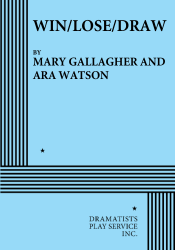THE STORIES: Little Miss Fresno (jointly written by both authors) deals hilariously with two very competitive mothers whose daughters are in the semi-finals of a local moppet beauty contest. One mother is a gossipy veteran who coolly keeps a score card along with the judges; the other, a first-timer, is anxious and ill-at-ease. When both daughters win there is a truce between them—but the finals are still to come. (2 women.)
Final Placement (written by Ara Watson). The scene is the Tulsa office of a child welfare caseworker. A mother guilty of child abuse is intent on regaining the custody of her son, even though he has been put up for adoption by the courts. Despite her poverty and ignorance she displays a touching eloquence—and a disquieting menace—as she attempts to stave off the inevitable. (2 women.)
Chocolate Cake (written by Mary Gallagher) is about two secret gorgers who meet in a hotel room while attending a women's conference. One is a simple country mouse, married to a mechanic; the other a brassy city dweller whose husband is a wealthy businessman. Inevitably their conversation gets around to their favorite topic "food," but the funnier their exchanges become the more we are made poignantly aware of the deprivation and disappointments which have led them to compensate with compulsive overeating. (2 women.)
